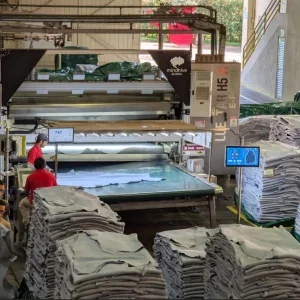JBS Couros, the world’s largest leather processing company, will be unveiling a new concept at the APFL fair in Hong Kong: its Kind Leather range of sustainable leather. The new range is the result of two years’ research and development driven by current and future consumer requirements. The fair will run from 13-15 March.
“Kind Leather will revolutionise the industry, changing the way leather is made globally and building a closer connection to consumers”, said Roberto Motta, CEO of JBS Couros.
The new leather is made using an innovative process and a more efficient format, providing several environmental, social and economic benefits based on intelligent use of raw materials and resources.
“Leather is an organic and highly durable product," said Fernando Bellese, marketing and sustainability manager at JBS Couros. "But what makes Kind Leather truly sustainable is the way it is processed, using only those parts of the hide best suited for leather. We were able to create a higher quality product while avoiding waste and using fewer products to treat the hide."
Kind Leather also provides additional sustainability through its end-to-end traceability programme, which gathers data throughout the leather production chain, from the farm to the end product. JBS Couros is the industry’s only company offering this level of production chain visibility, at large scale, combining a robust leather traceability programme with a modern monitoring system that oversees and verifies more than 80 thousand cattle suppliers in Brazil, ensuring they comply with the social and environmental standards set out in the Company’s Responsible Raw Material Procurement Policy.
The system monitors a wide range of issues, from deforestation of native forest, invasion of indigenous land and environmental conservation areas, or areas embargoed by the Brazilian Institute for the Environment and Natural Resources (IBAMA), to ensuring suppliers do not employ child or slave labour.
This change in the production process also boosts productivity from leather cutting machines and finishing plants, improves hide use and guarantees more ergonomic working conditions. JBS carried out productivity tests in partnership with companies involved in the leather cutting process, focusing on the automotive market, showing the new system improves yields by up to 10 percentage points compared with the traditional industry models. Another benefit of sustainable leather is that natural hide components that were previously discarded, or turned into goods offering little added value after processing, can now be used elsewhere to make food items, such as bovine collagen, or beauty products.
The Kind Leather brand
The Kind Leather logo unites aspects of nature with the new leather cutting characteristics.
“Our goal is to show the product has sustainability running through its DNA. This brand embodies a new way of producing this sought-after yet traditional raw material”, said Bellese.
The executive also said the range’s next step is to find strategic partners who share JBS Couros’ principles and goals to bring Kind Leather to end consumers.
Kind Leather in numbers
- 65% fewer CO2 emissions in wet-blue leather transportation by reducing the number of trucks needed to ship the product
- 54.2% less water and a 20% drop in energy used during the tanning process
- A 28% reduction in finishing products used
- Up to a 45% decrease in trimming waste from leather cutting.
JBS Couros will be an exhibitor at APFL, where it will have a 144m² stand to showcase its other collections for the automotive (Virgus – semi-finished), footwear (Cambré – semi-finished), furniture (Authentic Collection – finished) and leather goods (Lived Fashion by Conceria Priante – finished) markets.






